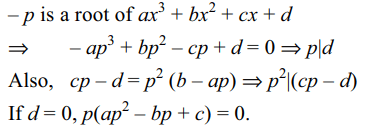1. If p > 1/2, the number of real solutions
of the equation
\[\sqrt{x^{2}+2px-p^{2}}+\sqrt{x^{2}-2px-p^{2}}=1\] (1)
is
a) 0
b) 1
c) 2
d) infinite
Explanation: For each x \[\epsilon\] R, we have

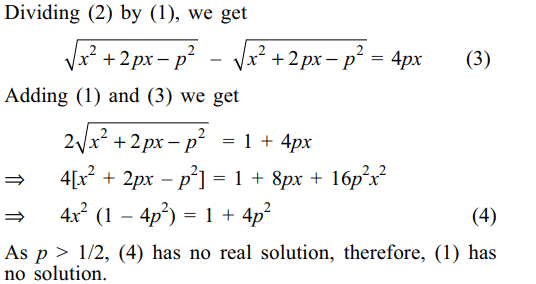
2. If a, b, c are distinct real numbers, then
number of solutions of
\[\frac{x+a}{x+b}+\frac{x+b}{x+c}+\frac{x+c}{x+a}=3\]
is
a) 0
b) 1
c) 2
d) infinite
Explanation:
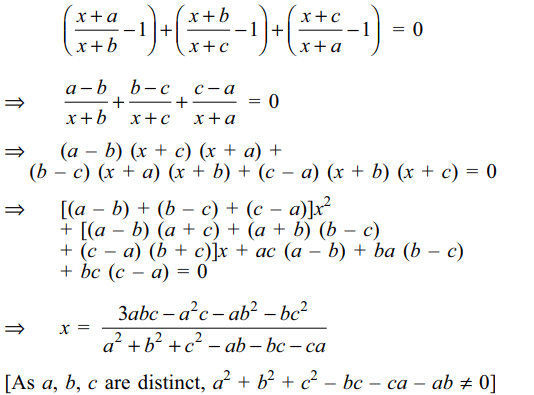
3. Number real solutions of the equation
\[\sum_{k=1}^{2019}k^{2}\mid x^{2}+\left(k+3\right)x-k-4| = 0\] (1)
is
a) 0
b) 1
c) 2
d) infinite
Explanation:

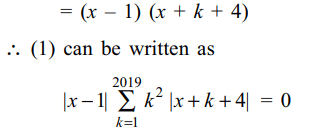

4. Suppose \[a,b \epsilon\] R. Let \[f\left(x\right)=3x^{2}+2ax+b\] if
\[\int_{-1}^{1} \mid f \left(x\right)| dx>2\] , then f (x) = 0 has
a) distinct real roots
b) equal roots
c) purely imaginary roots
d) nature of roots depend on values of a, b
Explanation:

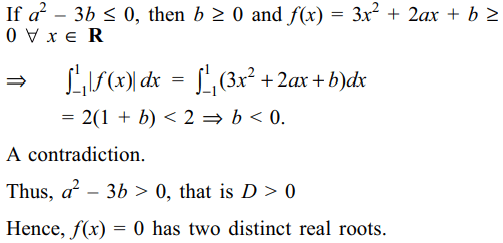
5.If [x] = greatest integer \[\leq x\] , then number
of solutions of the equation \[\left(x-\left[x \right]\right)\left(\frac{1}{x}+\frac{1}{\left[x\right]}\right)=2\] (1)
is
a) 0
b) 1
c) 2
d) infinite
Explanation:
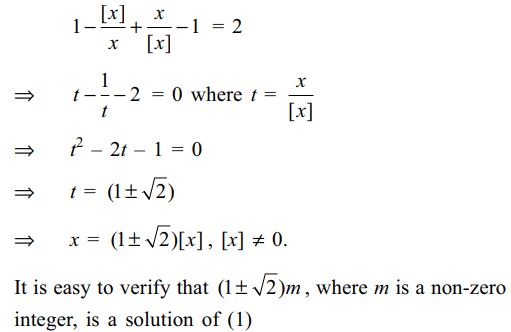
6. Number of real solutions of the equations
\[\sqrt{1-2x}+\sqrt{1+2x}=\sqrt{\frac{1-2x}{1+2x}}+\sqrt{\frac{1+2x}{1-2x}}\] (1)
is
a) 0
b) 1
c) 2
d) infinite
Explanation:

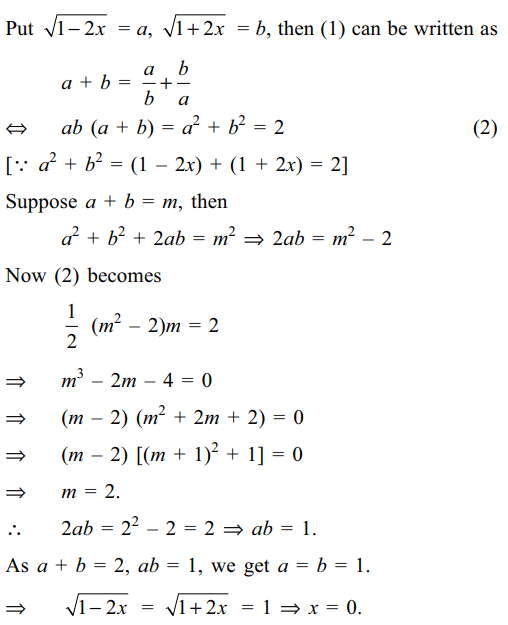
7. Let p and q be real numbers such that
\[p\neq 0,p^{3}\neq q\] and \[p^{3}\neq -q\] . If \[\alpha\] and \[\beta\] are nonzero complex
numbers satisfying \[\alpha + \beta = -p\] and \[\alpha^{3} + \beta^{3} =q\] , then a
quadratic equation having \[\frac{\alpha}{\beta}\] and\[\frac{\beta}{\alpha}\] as its roots is
a) \[\left(p^{3}+q\right)x^{2}-\left(p^{3}+2q\right)x+\left(p^{3}+q\right)=0\]
b) \[\left(p^{3}+q\right)x^{2}-\left(p^{3}-2q\right)x+\left(p^{3}+q\right)=0\]
c) \[\left(p^{3}-q\right)x^{2}-\left(5p^{3}-2q\right)x+\left(p^{3}-q\right)=0\]
d) \[\left(p^{3}-q\right)x^{2}-\left(5p^{3}+2q\right)x+\left(p^{3}-q\right)=0\]
Explanation:

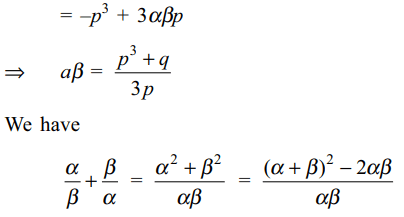
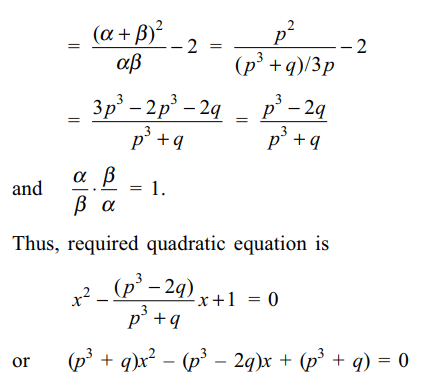
8. The quadratic equation p(x) = 0 with real coefficient has purely imaginary roots .then equation
p(p(x)) = 0 has
a) only purely imaginary roots
b) all real roots
c) two real and two purely imaginary roots
d) neither real nor purely imaginary roots
Explanation: As p(x) is quadratic and p(x) = 0 has purely imaginary roots, p(x) must be of the form p(x) = a(x2 + b)
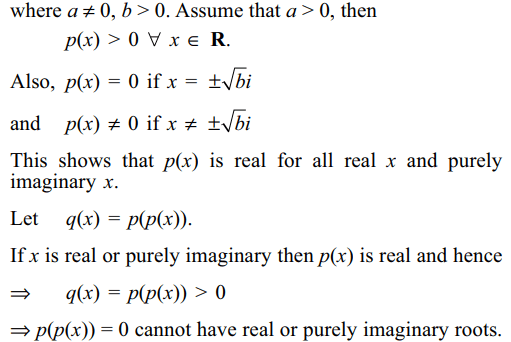
9. The product of real roots of the equation
\[\mid x\mid^{6/5}-26\mid x\mid^{3/5}-27=0\] (1)
is
a) \[-3^{10}\]
b) \[-3^{12}\]
c) \[-3^{12/5}\]
d) \[-3^{21/5}\]
Explanation: Put |x|3/5 = y , so that (1) becomes


10. Sum of the non-real roots of
\[\left(x^{2}+x-2\right)\left(x^{2}+x-3\right)=12\] (1)
is
a) 1
b) -1
c) -6
d) 6
Explanation: Put x2 + x = y , so that the equation (1) becomes
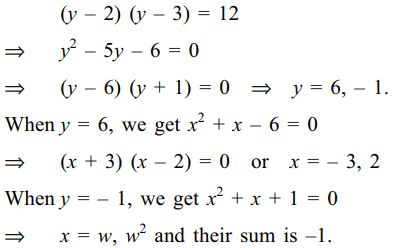
11. The number of irrational roots of the equation
\[\frac{4x}{x^{2}+x+3}+\frac{5x}{x^{2}+5x+3}=-\frac{3}{2}\]
is
a) 0
b) 1
c) 2
d) 3
Explanation:
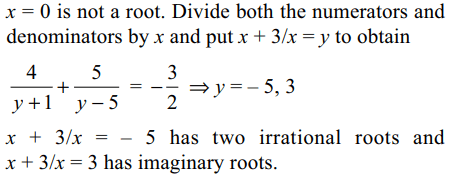
12. If \[\alpha,\beta,\gamma,\delta\] are the roots of
\[\left(x^{2}+x+4\right)^{2}+3x\left(x^{2}+x+4\right)+2x^{2}=0\]
then \[\mid\alpha\mid+\mid\beta\mid+\mid\gamma\mid+\mid\delta\mid\] is equal
a) 6
b) 8
c) 12
d) 25
Explanation:

13. x = 1 is a root of
\[\left(x^{2}-x+1\right)^{4}-6x^{2}\left(x^{2}-x+1\right)^{2}+5x^{4}=0\]
of multiplicity
a) 2
b) 3
c) 4
d) 6
Explanation:

14. The number of irrational roots of the equation
\[\left(x^{2}-3x+1\right)\left(x^{2}+3x+2\right)\left(x^{2}-9x+20\right)=-30\]
is
a) 0
b) 2
c) 4
d) 6
Explanation:
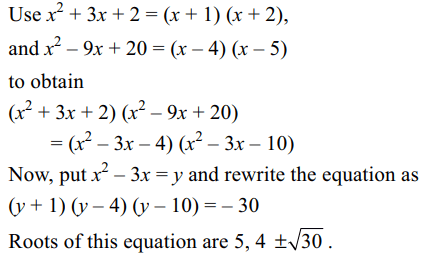
15.The number of roots of the equation
\[\sqrt{3x^{2}+6x+7}+\sqrt{5x^{2}+10x+14}=4-2x-x^{2}\]
is
a) 4
b) 3
c) 2
d) 1
Explanation:

16. The number of real values of x which satisfy the
equation \[\mid\frac{x^{2}-6\sqrt{x}+7}{x^{2}+6\sqrt{x}+7}\mid=1\]
a) 0
b) 1
c) 2
d) infinite
Explanation:

17. The number of real values of x which satisfy the
equation \[\mid\frac{x}{x-1}\mid+\mid x\mid =\frac{x^{2}}{\mid x-1\mid}\]
a) 1
b) 2
c) 5
d) infinite
Explanation:
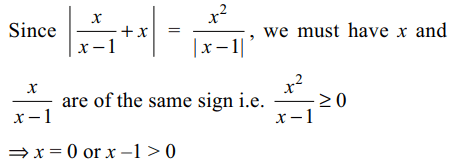
18. Sum of all the real values of x which satisfy the
equation \[\frac{\sqrt{2-x}}{\sqrt{2+x}}=\frac{2-x}{2+x}\]
a) 0
b) 2
c) 7.5
d) 11.5
Explanation:
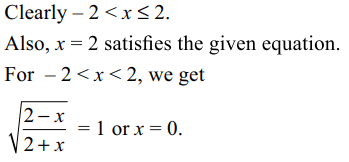
19. The set of real values of a for which the equation
\[\frac{2a^{2}+x^{2}}{a^{3}-x^{3}}-\frac{2x}{ax+a^{2}+x^{2}}+\frac{1}{x-a}=0\]
has a unique solution is
a) \[\left(-\infty,1\right)\]
b) \[\left(-1,\infty\right)\]
c) \[\left(-1,1\right)\]
d) \[R-\left\{0\right\}\]
Explanation:

20. The set of real values of a for which sum of the
roots of the equation\[\frac{1}{x}+\frac{1}{a}-\frac{1}{a^{2}}=\frac{1}{x+a-a^{2}}\]
is less than \[a^{3}/4\] is
a) \[\left(0,2\right)\cup\left(2,\infty\right)\]
b) \[\left(3,\infty\right)\]
c) \[\left(-1,0\right)\cup\left(3,\infty\right)\]
d) \[\left(2,\infty\right)\]
Explanation:


21. The real values of a for which \[\frac{x^{2}-ax-2}{x^{2}-3x+4}>-1\]
for each \[x \epsilon R\] , is
a) (– 1, 2)
b) (0, 7)
c) (-7, 1)
d) (2, 7)
Explanation:
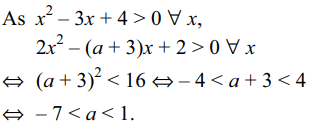
22. If \[a,b,c \epsilon R\] are distinct, then the condition(s) on
a, b, c for which the equation
\[\frac{1}{x-a}+\frac{1}{x-b}+\frac{1}{x-c}+\frac{1}{x-b-c+a}=0\]
has real roots is
a) \[a+b+c\neq 0,a\neq0\]
b) \[a-b-c\neq 0,a\neq0\]
c) 2a = b + c
d) none of these
Explanation:
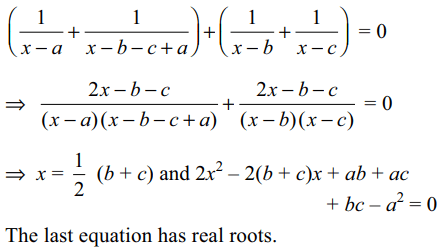
23. If \[f\left(x\right)=ax^{2}+bx+c,f\left(-1\right)< 1,f\left(1\right)>-1\]
and \[f\left(-3\right)< -4\]
then
a) a = 0
b) a < 0
c) a > 0
d) sign of a cannot be determined
Explanation:

24. The set of all values of k for which the equation
\[x^{2}+2 \left(k-1\right)x+\left(k-5\right)=0\] has
at least one non-negative root is
a) \[\left[1,\infty\right)\]
b) [-1,1]
c) \[(-\infty,-5\] ]
d) \[\left[5,\infty\right)\]
Explanation:

25.If \[3\pi/4<\alpha<\pi\] , then the set of values of \[\alpha\] for which
\[\left(\sin\alpha\right)x^{2}+\left(2\cos\alpha\right)x+\frac{1}{2}\left(\sin\alpha+\cos\alpha\right)\]
is square of a linear polynomial is
a) \[\left\{\frac{5\pi}{6},\frac{11\pi}{12}\right\}\]
b) \[\left\{\frac{11\pi}{12}\right\}\]
c) \[\left\{\frac{5\pi}{6}\right\}\]
d) \[\phi\]
Explanation:

26. If \[0\leq\phi\leq3\pi\] , then the set of all values of \[\phi\] for which
sum of the squares of the roots of the equation
\[x^{2}+\left(\sin \phi -1\right)x-\frac{1}{2}\cos^{2}\phi=0\]
is greatest is
a) \[\left\{\pi,\frac{3\pi}{2},2\pi,3\pi\right\}\]
b) \[\left\{\pi,3\pi\right\}\]
c) \[\left\{2\pi,\frac{5\pi}{4}\right\}\]
d) \[\left\{\frac{3\pi}{2}\right\}\]
Explanation:
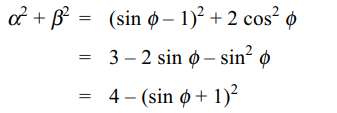
27. The set of values of b for which
\[2\log_{1/36}\left(bx+28\right)=-\log_{6}\left(12-4x-x^{2}\right)\]
has exactly one solution is
a) \[\left(-\infty,-14\right)\cup\] [14/3, \[\infty)\]
b) [14/9, \[\infty)\]
c) \[(-\infty\] ,-14] \[\cup\left\{4\right\}\cup\] [14/3,\[\infty\] ]
d) \[\left\{4\right\}\]
Explanation:
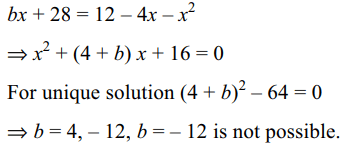
28. If \[2x^{2}+3x+4=0\] and \[ax^{2}+bx+c=0\] , where
\[a,b,c \epsilon N\] have a common root, then the least value
of a + b + c is
a) 10
b) 9
c) 8
d) 6
Explanation:
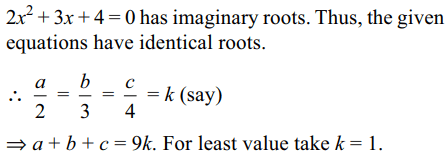
29. Let p, q, r, s be real numbers such that pr = 2(q +
s). Consider quadratic equations \[x^{2}+px+q=0\] and
\[x^{2}+rx+s=0\] . Then
a) none of these has real roots
b) both have real roots
c) at least one has real roots
d) at most one has real roots
Explanation:


30. Let \[a< 0,a\neq -2\] . The equation \[x^{2}+a\mid x\mid+1=0\] has
a) no real roots
b) at least two real roots
c) exactly four real roots or no real roots
d) none of these
Explanation:

31. Let \[f\left(x\right)=x^{3}+3x^{2}+6x+2009\] and
\[g\left(x\right)=\frac{1}{x-f\left(1\right)}+\frac{2}{x-f\left(2\right)}+\frac{3}{x-f\left(3\right)}\]
The number of real solutions of g(x) = 0 is
a) 0
b) 1
c) 2
d) infinite
Explanation:
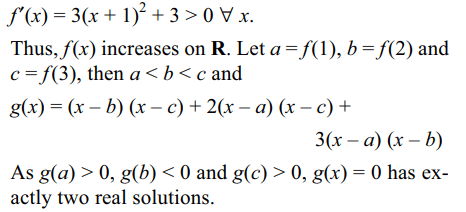
32. Let \[\alpha,\beta \epsilon R ,\beta\neq 0\] and \[\alpha+i\beta\] be a root of
\[x^{3}+qx+r=0\] where \[q, r \epsilon R\] . A cubic equation with real coefficients one of whose roots is \[\alpha\]
, is
a) \[x^{3}-qx+r=0\]
b) \[x^{3}+2qx+r=0\]
c) \[x^{3}+4qx-8r=0\]
d) none of these
Explanation:
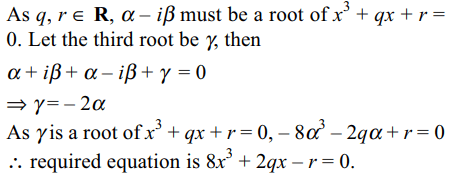
33. Suppose a, b are complex numbers and
\[x^{3}+ax+b=0\] has a pair of complex conjugate roots,
then
a) a is real and b is imaginary
b) a is imaginary and b is real
c) both a and b are real
d) none of these
Explanation:
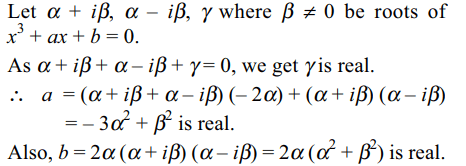
34. The number of solution of \[10^{2/x}+25^{1/x}=\left(\frac{65}{8}\right)\left(50^{1/x}\right)\]
is
a) 0
b) 1
c) 2
d) infinite
Explanation:
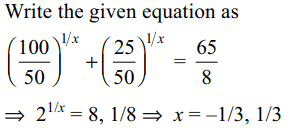
35. The equation \[\left(\frac{10}{9}\right)^{x}= - 3x^{2}+2x-\frac{9}{11}\]
has
a) no solution
b) exactly one solution
c) exactly two solutions
d) none of these
Explanation:

36. Let \[a,b,c \epsilon R\] and a \[\neq\] 0 be such that \[\left(a+c\right)^{2}< b^{2}\] ,
then the quadratic equation \[ax^{2}+bx+c=0\] has
a) imaginary roots
b) real roots
c) two real roots lying between (– 1, 1)
d) none of these
Explanation:

37. The number of real solution of \[4^{x+1.5}+9^{x+0.5}=\left(10\right)\left(6^{x}\right)\]
is
a) zero
b) one
c) two
d) infinite
Explanation:

38. If roots of the equation \[x^{2}-2mx +m^{2}-1=0\] lie in
the interval (– 2, 4), then
a) – 1 < m < 3
b) 1 < m < 5
c) 1 < m < 3
d) -1 < m < 5
Explanation:

39. The number of solutions of the equation
\[\sin \left(\frac{\pi x}{2\sqrt{3}}\right)=x^{2}-2\sqrt{3}x+4\]
is
a) 1
b) 2
c) 0
d) infinite
Explanation:
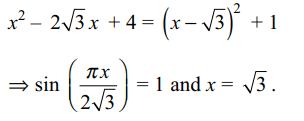
40. If x is real, then the least value of the expression
\[\frac{x^{2}-6x+5}{x^{2}+2x+2}\]
is
a) -1
b) -1/3
c) -1/2
d) none of these
Explanation:

41. If \[\alpha\] and \[\beta\] \[\left(\alpha<\beta\right)\] are the roots of the equation
\[x^{2}+bx+c\] , where c < 0 < b, then
a) \[\alpha < 0<\beta<\mid\alpha\mid\]
b) \[\beta>\mid\alpha\mid\]
c) \[\mid\alpha\mid +\mid\beta\mid<2\]
d) none of these
Explanation:

42. If x is real, and y = \[\frac{x^{2}+2x+c}{x^{2}+4x+3}\]
takes all real values
then
a) 0 < c < 2
b) \[0\leq c\leq 1\]
c) – 1 < c < 1
d) \[-3\leq c\leq 1\]
Explanation:
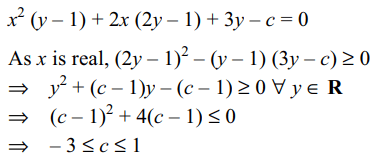
43. The smallest integer x for which the inequality \[\frac{x-5 }{x^{2}+5x-14}>0\] is satisfied is given by
a) -6
b) -5
c) -4
d) -3
Explanation:
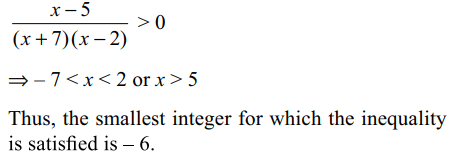
44. If \[\mid a\pm b \mid>c\] and \[a \neq0\] , then the quadratic equation
\[a^{2}x^{2}+\left(b^{2}+a^{2}-c^{2}\right)x+b^{2}=0\]
a) has two real roots
b) both positive roots
c) cannot have real roots
d) none of these
Explanation:

45. If abc < 0, then the equation
\[ax^{2}+2\left(b+c-a\right)x+bc=0\] , has
a) real roots
b) one positive and one negative root
c) both positive roots
d) both a and b
Explanation:

46. The equation \[1+\sqrt{1-\sqrt{x^{4}-x^{2}}}=x,x \epsilon R\]
has
a) only positive solutions
b) exactly one solution
c) at least two solutions
d) both a and b
Explanation:
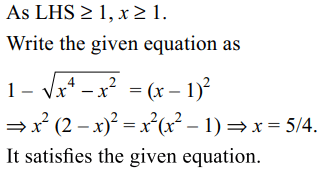
47. The equation \[x+\sqrt{x}+\sqrt{x+2}+\sqrt{x^{2}+2x}=3\]
has
a) no solution
b) at least one solution
c) only positive solutions
d) both b and c
Explanation:
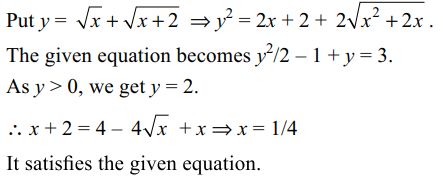
48.Let a, b, c be the sides of an obtuse angled triangle
with \[\angle C >\pi/2\] . The equation
\[a^{2}x^{2}+\left(b^{2}+a^{2}-c^{2}\right)x+b^{2}=0\]
has
a) two positive roots
b) one positive and one negative root
c) two real roots
d) two imaginary roots
Explanation: It has two imaginary roots
49. The equation
\[\sqrt{x-1}+\sqrt{x+3}+2\sqrt{\left(x-1\right)\left(x+3\right)}=4-2x\]
has
a) exactly one integral solution
b) all its solutions in [1, 2]
c) sum of all the solutions is 1
d) All of the above
Explanation:


50. The equation \[x^{3}+1=2 \left(2x-1\right)^{1/3}\] has
a) one rational solution
b) two irrational solutions
c) sum of roots equal to zero
d) All of the above
Explanation:
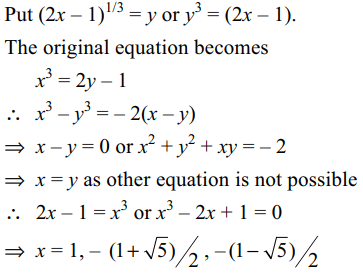
51. Let P(x) be a polynomial such that
\[P \left(x+2 \right)=x^{2}+3x-2\] . Which one of the followings
are true statement?
a) Product of the roots of P(x) = 0 is – 4
b) P(x) must be of degree 2
c) P(x) = 0 has two irrational roots
d) All of the above
Explanation:

52. Let P(x) be a polynomial such that
\[P \left(x^{2}+2 \right)=x^{17}-3x^{5}+x^{3}-3\] , then
a) P(x) = 0 has at least 34 roots
b) P(x) = 0 has exactly 17 roots
c) Sum of the roots of P(x) = 0 is – 193
d) none of these
Explanation:

53. Let \[P \left(x \right)=a_{0}+a_{1}x+...+a_{n}x^{n},a_{n}\neq 0\] be such that
\[P \left(x^{2} \right)=P (x)^{2} \] , then
a) \[a_{0}=1\]
b) \[a_{0}=a_{1}=....=a_{n-1}=0\]
c) \[a_{n}=1\]
d) Both b and c
Explanation:
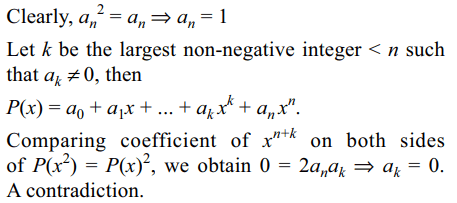
54. Let p, q be non-zero, real numbers and \[x_{1},x_{2},x_{3}\] be
the roots of \[x^{3}+px+q=0\] such that
\[x_{3}=\frac{1}{x_{1}}+\frac{1}{x_{2}}\] then
a) q is a root of \[x^{2}+px+q=0\]
b) q < 0
c) p < 0
d) Both a and c
Explanation:
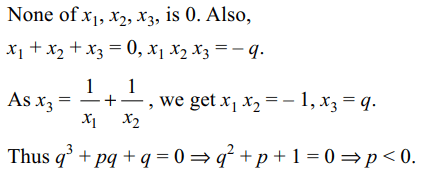
55. Let \[n\epsilon N, n>1\] and \[\alpha\epsilon R\] be such that sin\[\alpha \neq 0\] ,
and let \[p\left(x\right)=x^{n}\sin\alpha -x \sin n\alpha +
\sin \left(n-1\right) \alpha\]
then
a) \[\cos\alpha \pm 1\sin \alpha\] are zeros of p(x)
b) p(x) is divisible by \[x^{2}-2x \cos\alpha+1\]
c) p(x) is divisible by \[x^{2}+2x \cos\alpha+1\]
d) Both a and b
Explanation:
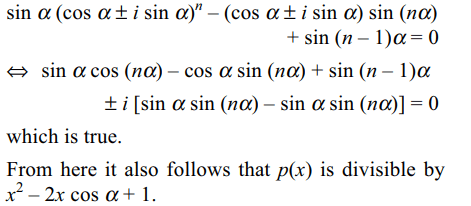
56. Let \[n \epsilon N, n>1\] and \[\alpha \epsilon R\] be such that \[\sin\alpha\neq 0\]
and let\[p\left(x\right)=\left(x\sin\alpha+\cos\alpha\right)^{n}-x\sin\left(n\alpha\right)-\cos\left(n\alpha\right)\]
then
a) \[\pm\] i are zeros of p(x)
b) p(x) is divisible by \[x^{2}+1\]
c) \[\pm\] 1 are zeros of p(x)
d) Both a and b
Explanation: p(x) is divisible by \[x^{2}+1\]
57. Let a, b, c > 0 and for all \[p,q \epsilon R\] with p + q = 1
\[pa^{2}+qb^{2}>pbc^{2}\] , then
a) a + b > c
b) a + c > b
c) b + c > a
d) All of the above
Explanation:
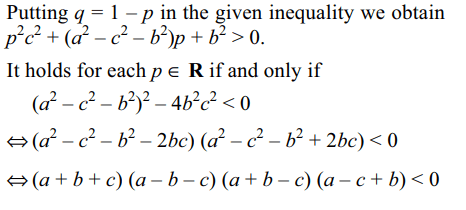
58. Let a, b be two distinct roots of
\[x^{4}+x^{3}-1=0\] , and p(x) = \[x^{6}+x^{4}+x^{3}-x^{2}-1\]
a) ab is a root of p(x) = 0
b) a + b is a root of p(x) = 0
c) both a + b and ab are roots of p(x) = 0
d) none of ab, a + b is a root of p(x) = 0
Explanation:
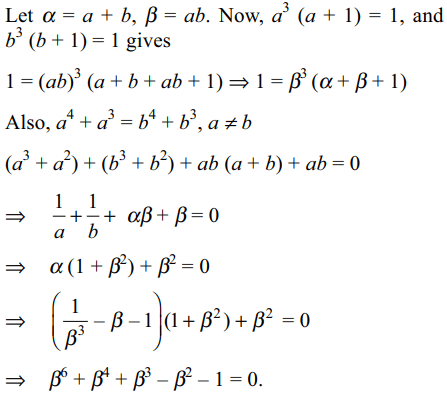
59. If \[x^{2}+px+1\] is a factor of \[ax^{3}+bx+c\] , then
a) ax + c is also a factor of \[ax^{3}+bx+c\]
b) ap+c=0
c) \[a^{2}-c^{2}=ab\]
d) All of the above
Explanation:
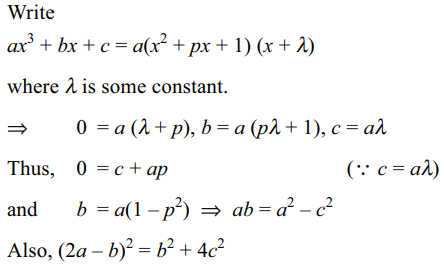
60. Let a, b, c, d and p be integers such that \[p\neq 0\] . If
x + p is a factor of \[ax^{3}+bx^{2}+cx+d\] , then
a) \[p\mid d\]
b) \[p^{2}\mid \left(pc-d \right)\]
c) \[d=0\Rightarrow p\] is a root of \[ax^{2}-bx+c=0\]
d) All of the above
Explanation:
